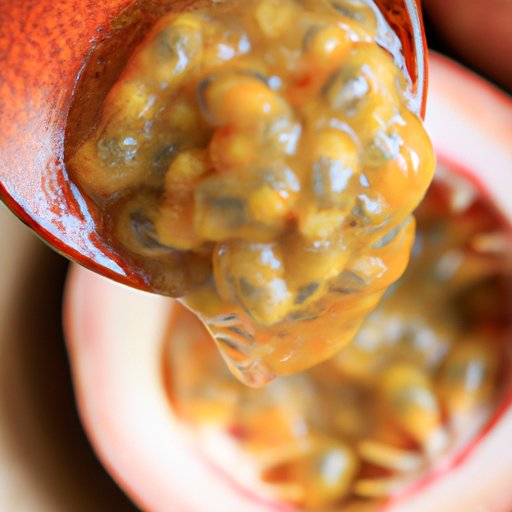
Introduction
Passion fruit is a tropical fruit that originates from South America and is now widely enjoyed around the world. The fruit is known for its tangy, sweet taste and has many nutritional benefits. But what about the seeds? Are they safe and healthy to eat? In this article, we will explore the nutritional value of passion fruit seeds and discuss whether or not they are safe to consume. We’ll also provide some delicious recipe ideas for incorporating passion fruit seeds into your meals.
How to Eat Passion Fruit Seeds
Before you can eat passion fruit seeds, you need to prepare the fruit for consumption. Start by washing the fruit, then cutting it in half with a sharp knife. The fruit is filled with a gel-like pulp that contains the seeds.
To separate the seeds from the pulp, scoop out the pulp with a spoon and strain it through a sieve. This will remove most of the pulp and leave you with the seeds. You can also use a food processor or blender to blend the pulp and seeds, then strain the mixture through a sieve.
Passion fruit seeds have a crunchy texture and a slightly nutty flavor. They can be eaten raw or cooked and are a great addition to smoothies, yogurt, and salads. You can also sprinkle them on top of your breakfast cereal or mix them with granola.
Health Benefits of Consuming Passion Fruit Seeds
Passion fruit seeds are high in dietary fiber, which helps regulate digestion and can reduce the risk of heart disease, diabetes, and obesity. They also contain antioxidants, which protect the body’s cells from damage and reduce the risk of cancer, Alzheimer’s disease, and other chronic illnesses.
In addition, passion fruit seeds are a good source of healthy fats, including omega-3 and omega-6 fatty acids. These fats are essential for brain health, immune function, and reducing inflammation in the body.
Research has shown that passion fruit seeds can also help lower blood pressure, improve respiratory function, and boost the immune system. They may also have antimicrobial properties and help prevent infections.
Risks of Eating Passion Fruit Seeds
While passion fruit seeds are generally safe to eat, there are some potential risks to be aware of. For example, individuals with diverticulitis may want to avoid eating passion fruit seeds, as they can irritate the colon and cause abdominal pain.
In addition, some people may have an allergic reaction to passion fruit seeds. Symptoms of an allergic reaction can include hives, itching, and swelling of the lips, tongue, or throat. If you experience these symptoms after eating passion fruit seeds, seek medical attention immediately.
Recipe Roundup
Looking for some tasty recipe ideas for using passion fruit seeds? Here are a few to get you started:
- Passion Fruit Yogurt Parfait: Layer plain Greek yogurt, fresh passion fruit pulp, and passion fruit seeds in a glass for a delicious and nutritious breakfast or snack.
- Passion Fruit Salad Dressing: Whisk together passion fruit pulp, olive oil, honey, and balsamic vinegar for a tangy and sweet salad dressing.
- Passion Fruit Smoothie: Blend together frozen bananas, almond milk, passion fruit pulp, and passion fruit seeds for a refreshing and tropical smoothie.
- Passion Fruit Chia Pudding: Mix together chia seeds, coconut milk, passion fruit pulp, and a touch of honey for a healthy and filling dessert or breakfast.
- Passion Fruit Salsa: Mix together diced passion fruit, mango, red onion, jalapeño, cilantro, and lime juice for a flavorful and colorful salsa that pairs well with fish or chicken.
Cultural Significance of Passion Fruit Seeds
Passion fruit has a rich history and cultural significance in the cuisines of many countries. In Brazil, passion fruit juice is a popular drink, while in Peru, passion fruit is used to flavor desserts and sauces. In Australia, passion fruit pulp is a key ingredient in pavlova, a classic dessert made with meringue and whipped cream.
The seeds are commonly used in Southeast Asian cuisine, where they are often roasted and eaten as a snack. In parts of Africa, the seeds are used to make a traditional drink called “passion fruit squash,” which is similar to lemonade but with a tangy passion fruit flavor.
Research on Safety and Nutritional Value of Passion Fruit Seeds
Several studies have been conducted on the safety and nutritional value of passion fruit seeds. One study published in the Journal of Food Science found that passion fruit seeds contain high levels of antioxidants and have potential as a functional food ingredient.
Another study published in the journal Nutrition Research found that passion fruit seed flour can be used as a source of dietary fiber, which can benefit gut health and reduce the risk of chronic disease.
Overall, research suggests that passion fruit seeds are safe and nutritious to eat, and can provide many health benefits when included as part of a balanced diet.
Conclusion
In conclusion, passion fruit seeds are safe and healthy to eat and are packed with nutritional benefits. They are high in dietary fiber, antioxidants, and healthy fats, and can help lower blood pressure, improve respiratory function, and boost the immune system. While there are some potential risks to be aware of, such as diverticulitis and allergies, most people can enjoy passion fruit seeds in moderation.
If you haven’t tried incorporating passion fruit seeds into your meals yet, give it a try and see how you like them. Whether you sprinkle them on top of your breakfast cereal or include them in a delicious smoothie or salad, passion fruit seeds are a great way to add flavor and nutrition to your diet.




